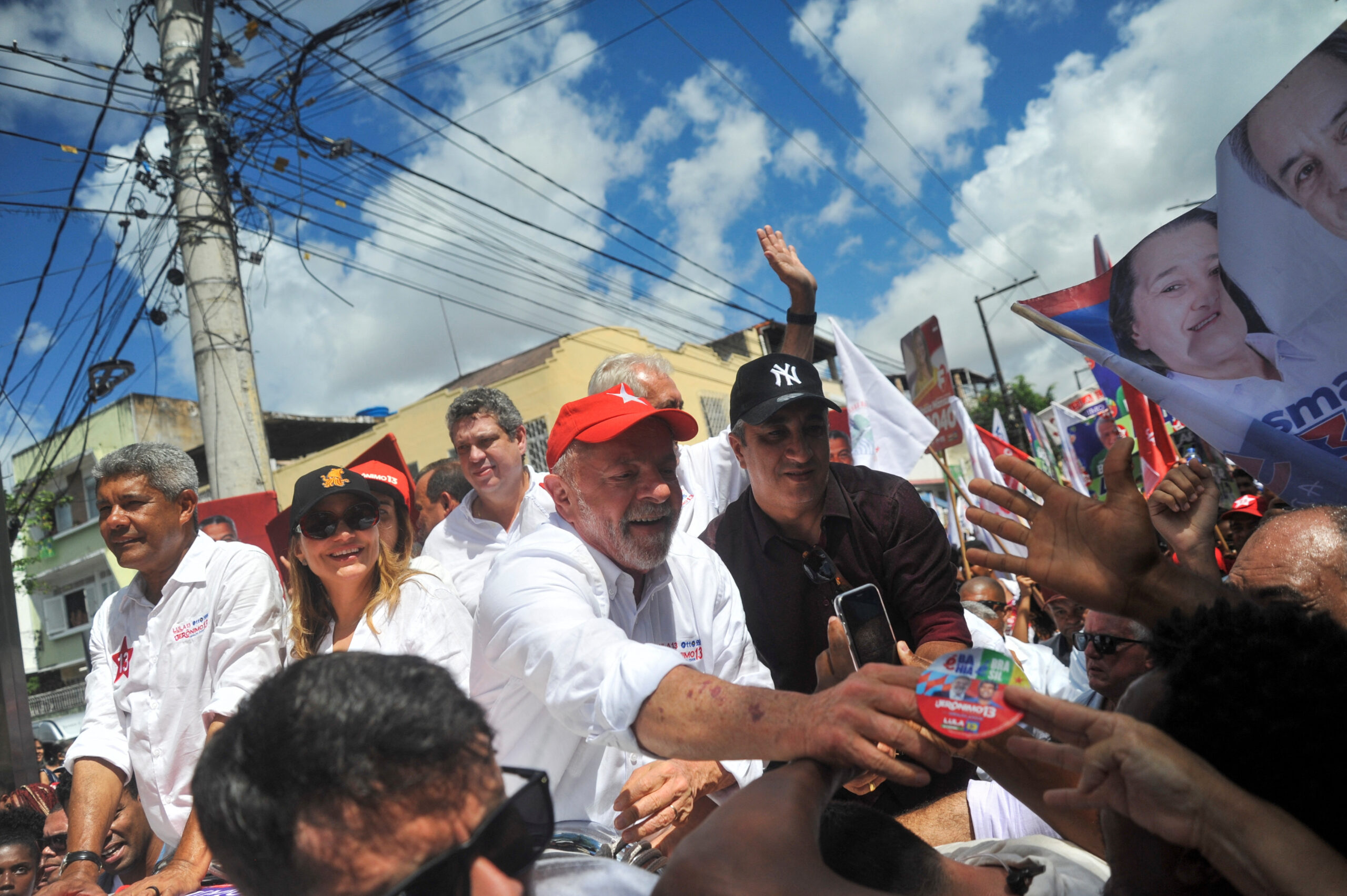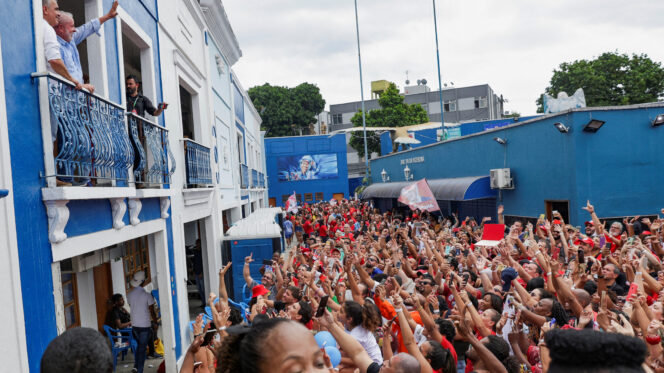Brazil Election: Standing With Lula Means Standing Against Poverty
Lula lifted 20 million people out of poverty during his presidency. Bolsonaro threw the same number back into destitution.
by Joana Ramiro
2 October 2022

Brazil is infamous for its wealth disparity. For many, it has become synonymous with city-sized slums like the favelas of Rio de Janeiro, their culture commodified in music and film, their survivalist nature praised as ‘entrepreneurial’ by the most craven neoliberal minds. But destitution in Brazil extends beyond the shanty towns.
Outside my window, in the centre of São Paulo, a man covered in dirt and dressed in ragged clothes is lying on the pavement. Commuters walk past him seemingly unperturbed, some having to nearly walk over his head in the early morning scramble to and from the metro station. This is not an isolated case, poverty is everywhere in the finance capital of Brazil. In front of São Paulo’s Cathedral, thousands of destitute men and women congregate around bathing stations and soup kitchens. During the winter months, when temperatures plummet as low as 8ºC, volunteers hand out warm clothes from two large gazebos.
In the last four years, this tragic reality has worsened with an estimated 33 million people – or 15.5% of the population – going hungry every day. The numbers come from a network of renowned Brazilian and international NGOs, including Oxfam. Yet the Jair Bolsonaro administration argues such figures are impossible and that the most vulnerable are already being helped by governmental benefit schemes.
After years on the UN hunger map – which tracks countries where over 2.5% of the population lacks food – the country was finally removed from the list in 2014, after it reduced the number of people suffering from food insecurity by 82%. To thank were the policies of social investment implemented by the Workers Party (PT) in its nine years in power. In particular, the zero hunger programme, introduced in 2003 under the first Lula da Silva government, was seen internationally as exemplary of how to conduct a successful social campaign in the context of a wider, comprehensive scheme of benefits and state initiatives.
Yet during the pandemic, Brazil returned to the hunger map, with many blaming Bolsonaro’s mishandling of the crisis. The problem is now so flagrant that during the last presidential debate on Thursday, it wasn’t the left but the main centre-right candidate, Simone Tebet, who confronted Bolsonaro over his failure to tackle poverty and hunger. “Let’s talk about Brazil, let’s talk about the real problems, let’s talk about hunger, which your excellency, as president, says is non-existent”, the Brazilian Democratic Movement (MDB) candidate said. “You don’t know Brazil’s reality,” she added, “Like walking around in the big city centres and seeing children by traffic lights going hungry and begging for a plate of food.”
Centrão: A broad front against Bolsonarismo.
If Bolsonaro is dethroned in these elections – making him the first Brazilian president ever to not be re-elected – it will be in great part because of a backlash from the political centre, locally known as centrão. This amorphous group of politicians, always aiming to be as close as possible to executive power, seems to have deemed Bolsonaro no longer fit for purpose. His attempt to appeal to congress members by allocating nearly R$40m (just under £7m) of the federal budget in funds to parliamentarians has struck many as too crass, even for Brazilian politics. His inflammatory rhetoric, inciting violence and possibly armed insurrection, has made many in the centrão recoil, fearing the instability and unpredictability of the head of state.
This has made the centrão turn to Lula, despite many having considered the leftist public-enemy-number-one until relatively recently. Lula’s slate includes ten political parties, from the Communist Party of Brazil (PCdoB) to the Christian Democratic party. Lula’s VP, Geraldo Alckmin, supported the so-called “coup” that impeached Lula’s successor, Dilma Rousseff.
“Nobody can govern while being held hostage by congress,” Lula said on Friday, during a press conference. Asked whether he had the energy to lead such a politically divided coalition, Lula responded: “I am 76 years of age and I have a new wife, I’m madly in love. Why would I not have the energy to fix the centrão?”
To Lula’s far-left supporters, like members of the Peace and Socialism party (PSOL), winning is just the first challenge. “Listen, we have two stages,” PSOL leader Guilherme Boulos told me. “The first stage is the electoral process to beat Bolsonaro, the second stage is, upon a Lula victory, to question where the government is heading.” Upon Lula’s election, Boulos assures me, there will be a “struggle over the direction of government, because in this broad democratic front there are vastly different positions.”
Lula the communist vs Lula the liberal.
Back at my temporary home, my hosts have friends over to watch the final debate. Over cigarettes and pumpkin soup, they discuss who their relatives are supporting – who has changed their mind and will “vote Lula for the first time ever”.
We get on to the topic of how far a Lula government could actually go. Lula’s first election twenty years ago was the result of a coalition of five parties, today there are twice as many. Someone suggests that consensus between Lula and the centrão isn’t that surprising. On closer inspection, when in power, Lula is a liberal politician with a track record of economic conservatism mixed with progressive social policies. Under Lula, Brazil witnessed labour and pension reforms, but the PT never dared propose large fiscal reforms or touch the nation’s ultra-rich. When I ask how to explain this seeming contradiction in terms – Lula, the elites’ hated communist vs Lula, the liberal – one of my hosts says: “Brazil is such a fucked up country that even Lula’s politics turn out radical.”
Lula’s political mellowness and Bolsonaro’s perversity are two sides of the same coin. The two sides of a wealthy nation where every social sector demands a little more, regardless of whether they have nothing or already own a hell of a lot. The difference lies in Lula having lifted 20 million people out of poverty during his presidency, and Bolsonaro having thrown the exact same number back into it during his. And on Sunday voters will have to choose which legacy they want to get behind.
Joana Ramiro is a journalist, writer, broadcaster and political commentator.


